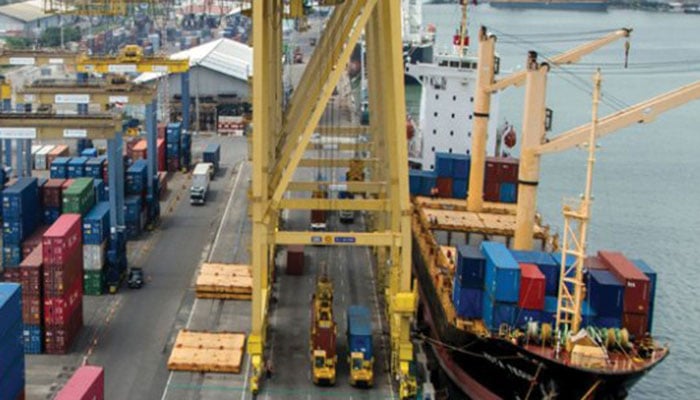Government team to meet exporters as coronavirus threatens businesses
Liquidity crisis, sales tax refunds, and other issues to be discussed in the meeting, officials say
March 20, 2020

ISLAMABAD: In the wake of the adverse impact of coronavirus prevention measures on industrial production and exports, the government’s top financial managers and leading exporters will be putting their heads together to find ways to resolve the host of challenges faced by businesses in Pakistan.
Issues to be discussed include the chronic liquidity crisis that has aggravated manifold mainly because of delayed payments of export proceeds and suspension of shipments to Europe, United States, and other big economies, according to The News.
The suspension of collection of sales tax, restoration of zero rating, and speedy refund of sales tax are also on the agenda, suggest sources. Exports have been on the decline in recent weeks, reports claim.
Also read: Coronavirus: Large-scale manufacturing contracts, downward trend to continue
In the month of February, the production of the export industry was at 100%, but has now tumbled to an alarming 18% as global orders decline due to the spreading coronavirus.
Pakistan thus may not be able to catch up to the export target of $24 billion because exports may decline by 50% during the March-June period.
The meeting is being held keeping in view the directions of Prime Minister Imran Khan, who in his speech to the nation earlier this week, had said that the government will take care of exporters and hold talks with the IMF for providing relief to the export industry.
Adviser to the PM on Finance and Revenue Dr Hafeez Shaikh; Adviser to the PM on Commerce, Textile and Industries Abdul Razak Dawood; and State Bank of Pakistan Governor Reza Baqir; will hold crucial talks with leading exporters and pave the way for a resolution of the liquidity crisis.
Also read: 'Alarming situation going to turn worse': GDP growth target revised downwards to 2.6%
The meeting was confirmed by the Adviser to the PM on Commerce, Textile, and Industries Abdul Razak Dawood in an exclusive interview with The News here on Thursday over the damaging impact of the coronavirus on exports in Pakistan.
Dawood also disclosed that the commerce ministry had decided to allow import of all items related to coping with the coronavirus with zero duty and conveyed to the Ministry of Health the list of the names of items. A formal notification in this regard would be issued soon, he said.
Coming to exports of the country, the adviser highlighted saying that in the month of February, exports went up by 13.6%, and had increased to 14% by March 15, but started declining amid the global health crisis created by the coronavirus.
Also read: Stocks continue to take a battering; 100-index down 1,719 points; trading halted
He added that though export orders were still coming in, buyers had asked exporters to stop further production and complete the work in progress first, which is why the shipments have been stopped to EU, United States, and other economies.
Buyers in the EU, US, UAE and other countries have asked the Pakistani exporters not to further use raw material for more export consignments, he highlighted.
"Buyers have intimidated that their markets and big shopping centers, ports and docks are closed down and they have no space left to import items and keep them in their storage, as keeping the items in their storage will cost them," Dawood said.
Also read: SBP instructs banks to waive off online transaction charges amid coronavirus outbreak
This situation is not confined to Pakistan only as all regional economies -- such as Vietnam, Bangladesh and India -- are also facing similar constraints, i.e. halting of their export shipments because of zero demand from buyers.
Dawood, however, has pinned his hopes on China, where the number of victims and deaths because of the coronavirus are going down, and said that if this situation is tackled on a sustainable basis, Pakistan and China will be in a position to restart trade by end of April.
"Under the State Bank of Pakistan rules, export proceeds are bound to be deposited with the central bank in 180 days, but in the wake of delayed payments by buyers to exporters, the export industry wants the State Bank of Pakistan to enhance the period from 180 days to 360 days," he underlined.
Originally published in The News









